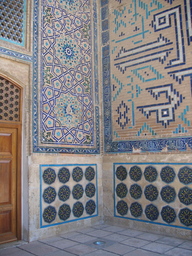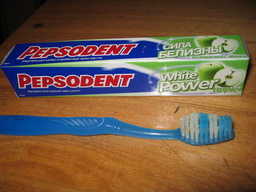
2005.08.06 Alma Ata, Kazakhstan

My time in Kazakhstan has been refreshing. I hadn't realized how wearying the infrastructure of Kyrgyzstan was until crossing into Taraz, on the Kazakhstan side of the border. Subtle things, such as decently stocked markets and paved roads have given me more energy to continue on with the trip. When leaving Kyrgyzstan I actually considered returning straightaway to Urumqi. Instead, I've lingered on, visiting Taraz, Shymkent, and Turkistan.
The main area I wanted to visit on this trip was the small city of Turkistan. The city itself is only remarkable for the great mausoleum on its outskirts, the tomb of Hoja Ahmed Yasui. Islamic art and calligraphy are favorites of mine, so I had high expectations. I was not disappointed.
I took a couple days around the city of Turkistan itself. While small, it was a good place to get a feel for Kazakhstan. I saw no Russians during my time there, quite opposite the large numbers here in Alma-Ata. I found a private room at an inexpensive ($3) hotel on the edge of the bazaar. The staff were all jovial, middle-aged Kazakh women. We shared watermelon and tea in the lobby, doing our best to communicate. Nobody spoke any English.
Visiting various museums and historical sites has inspired me, offering ideas of projects I'd like to create. Recently I've been seeing so much beautiful work done in media I'm not familiar manipulating: glazed, turquoise, ceramic tiles covering the mausoleum; Arabic calligraphy etched into stone slabs around various mosques; and an ancient wooden gameboard with stone pieces displayed at the Silk Road museum in Taraz.
The gameboard on view at the museum made me think of crafting a nice playing board for a game such as chess or Go. I thought it might be a fairly simple project to etch a Go grid into a large piece of slate. To add flourish, I could surround the grid with calligraphy about the edges.
I can't say whether I'll actually find the motivation to gather the tools and materials necessary for such a project upon return to Urumqi. Still, it was so pleasant to be in that state where I feel ambitious about trying new things, with good ideas coming constantly. It's been awhile since my mind was so abuzz in a creative way.
There have been other changes I've noticed in the way I've been processing what I observe on this trip. One such change is that the Cyrillic script has become far more readable in the last weeks. I managed to figure out the alphabet long before, having traveled across Russia many years ago. I was never very quick reading anything out, though. Additionally, the letters always struck me as having a certain twisted character to them. Sort of, I guess, Satanic-looking. This probably as they resemble the letters used in English, but occasionally appear backwards, or with weird extra doo-hickies.
Now I can often look at a word and hear its full sound in my head, rather than mentally stuttering through a string of letters. If the word is cognate to one used in English, I tend to absorb it at a glance. I've found that many words, such as cement or motor, have Russian equivalents that are practically unchanged from the English pronunciation: words like these no longer take time or mental effort to process.
I'm even finding that the script is in some ways more efficient than the way English uses the Roman script. So many times in English one sound will be represented by two letters, such as ch, ng, or sh. The Kazakh version of the Cyrillic script has one letter for each of those values, which makes a lot more sense. However, I still can't understand why they also use one letter to represent multiple sounds like ya and yo.
People aren't sure how to categorize me here. My features don't blend in quite as well as they do back in Xinjiang. My default is to speak in Uighur, which it seems everybody can understand. Nobody ever asks me if I am indeed, Uighur. The usual question is, "Are you a Turk?" I'm not sure the implication of the question. I figure two possibilities:
Of course the times that people do ask straight out where I'm from, it gets all the more confused.
"Where are you from?"
"America."
"No, no. I mean, what's your ethnicity?"
"I'm Chinese."
"You don't look Chinese. Where do you live?"
"In China."
"Oh." (Said in obvious disbelief.)
After I order at a restaurant or enquire about prices in a shop, people usually do want to know where I'm from. A common question after taking care of business is: "Are you from...", with the speaker filling in their guess as to where I'm from at the end. At this point I've heard the full range of countries between China and Europe. For some reason people in this area usually take me for either Turk or Turkmen. I hear "Uzbek" a lot, too. In China a lot of Uighurs take me for Uzbek as well, though most often people in Xinjiang ask me if I'm from Azerbaijan.
I've met few other travelers the month I've been on the road. I did initiate conversation with an older, French-speaking man in Cholpon-Ata, but it wound up as just a brief chat. I stayed in a dormitory last night, which was not horrible, though wound up stuck in a room with an older Swiss traveler who would not shut up.
While innocuous and not horribly offensive, Monsieur Suisse was one of those characters I least like to meet on the road: been everywhere, yet has nothing to say for it. He talked endlessly about how different China was from his present trip and the first time he was there. (No. Really?) He went on about how the cost of a fake student ID card in Bangkok is now up to $3, compared to $2 the first time he was there. (I wonder whether I will still be dickering over the price of fake student cards when I'm 43.) When I encouraged him to make it down to Turkistan and Shymkent, he questioned if he would be able to find anywhere cheap to stay--his photocopies of the Lonely Planet guidebook didn't list any. He blathered on about the least interesting things: "All the women in Kazakhstan dress sexy, like hookers in Europe. But the real prostitutes around here are all so unattractive..."
I didn't overly attempt to engage the conversation, not really sharing common ground. Still, I somehow found it impolite that he carried on about himself and his experiences, never asking about my trip. I suppose I should consider that experience a gentle reminder of why I usually find it worthwhile to spring for a private room.
 Supremacist Toothpaste? |
After a couple unremarkable days in Shymkent, I took the overnight train up here to Alma-Ata. It's wonderful to have this city be my last stop before returning to China. Even aside from the large Russian population, there's a strong European feel to the city itself: the cafes, pastry shops, and trams--it's a good place to relax and stock up on items hard to find in China.
Having finished up the peculiar tube of toothpaste I bought in China (honey flavor) I came across a suitably strange replacement. In this case it wasn't so much the flavor of the new toothpaste--apple--as the slogan on the box which attracted me. Both Russian and English text read: "White Power". I suspect the words were added by somebody who didn't realize the darker connotation of that phrase, but who knows? Russians do still dominate Alma-Ata and much of northern Kazakhstan.
Since arrival in Alma-Ata I have also purchased:
I'm about to head back to Urumqi. It's been a nice get-away, but I'm ready to be back in familiar territory, in my own flat for awhile. I hope to spend my remaining tenge at one of the western-style supermarkets on the way back to the railway station.